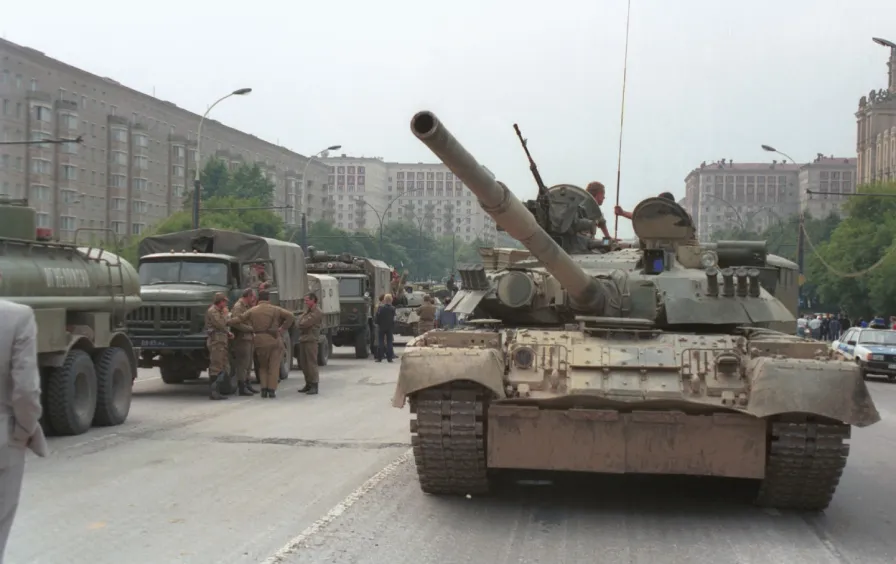During the failed 1991 coup against Gorbachev, the democratic press rose up with a unity and determination that is hard to imagine today.
By Nadezhda Azhgikhina

On the morning of August 19, 1991, my husband called the dacha where I was with our son and said that tanks were approaching Moscow. I left the baby with the grandmothers, got in the car, and went to the magazine office. I worked at the weekly Ogonyok, which together with two other weeklies, Moscow Newsand Literary Gazette, formed the media vanguard of Mikhail Gorbachev’s perestroika reforms. Tanks were already at our office. The organizers of the anti-Gorbachev coup had stopped the publication of the magazine, along with other “democratic” media.
By that evening, a group of editors had organized a new samizdatpublication: Obshchaya Gazeta (Joint Gazette) appeared on the first day of the coup—a joint publication by newspapers shut down by the coup leaders. It became the voice of resistance, and one of the first examples of professional solidarity.
That same day, a circle of defenders formed around the White House, the building of the Russian Federation Parliament and the symbol of our young democracy. Columns of demonstrators came from the center of Moscow, and people arrived from other cities. The desire to protect the budding democracy united the poor and relatively well-off, the old and very young, with people bringing whatever they could to support the demonstration: medical supplies, sandwiches, Thermoses. There was an incredible feeling of unity. Soldiers, policemen, and officers joined the defenders against the coup.
My American friends Catharine Nepomnyashchy and Jamey Gambrell were with me for the three days at the White House. So were colleagues from other countries. The USSR was fairly open by then; there were international conferences in Moscow, and their participants joined us as well. We joined in support of our common history, our common work, our movement for a future without confrontation and hatred.
In 1991, we thought that we could do it together, build a free and happy world.
Over the subsequent three decades, the significance of the August 1991 events has changed. In the early years, there was awe at the determination of the defenders and scorn for the foes and those who vacillated out of doubt, fear, and a desire to conform. More recently, the Russian media has dwelt on the naïveté of those who believed they were defending freedom, and even imputed evil intent, calling them agents of both foreign and domestic special services. On the eve of the 25th anniversary of the events, participants interviewed in many Russian publications expressed bitterness and disillusionment. The coup leaders and their allies were almost presented as heroes.
Modern Russian journalism, which was born in August 1991 with Obshchaya Gazeta, has also changed—and not just as a result of technology. It is impossible today to picture a dozen editors of national newspapers jointly supporting freedom of speech. It’s impossible to imagine the confidence that audiences had in the media in the perestroika period, when journalists were trusted more than Gorbachev and all Soviet institutions together. The solidarity that united journalists and readers in the summer of 2019 in defending Meduza reporter Ivan Golunov, who was arrested on fabricated charges, sadly did not continue into the pandemic period. New limits on freedom of speech and the persecution of critical voices have not given rise to mass protests. New legislation has cut off the oxygen needed for independent investigations and has paralyzed attempts at civic action. Censorship has reached all spheres, and the recently formed Commission on History Education (with the participation of the FSB and the General Procurator’s Office) has been charged with cleaning up the “falsification of history” with counter-propaganda. Propaganda is replacing the real picture of the past and present.
“Lies open the path to war!” Grigory Yavlinsky, leader of the Yabloko Party, recently warned on Ekho Moskvy radio. “Intoxicated by legislative permissiveness, the government has instigated an unprecedented attack on the press.… There are enough reasons to believe that Russia is preparing for the next, more repressive stage of the suppression of free thought and, possibly, for war. The state media is whipping up an atmosphere of hatred, hostility toward neighboring countries and the outside world is being planted. Is it necessary to say that lies are the most important tool in this preparation for war?… To tell the truth, to expose lies, to prevent war is the main thing.”
Writer Aleksandr Solzhenitsyn’s call to “live without lies” resonated with millions of Soviets who believed in perestroika and did not want a return to the Stalinist past. Freedom of speech was the first and most visible result. Thirty years ago, the public and the press stood up for their freedom. Others made use of the fruit of their victory. History knows many such examples.
The “wild market” that hit Russia and the devastation of the 1990s, the link between the authorities and the oligarchs, the “fat 2000s” when so many voluntarily accepted the contract offered by the authorities—material well-being in exchange for civil passivity—all this happened later. But for years, the amazing experience of August 1991 remained in the memory of the event’s participants and in the collective unconscious of the people.
The three days when people felt responsible for the fate of their country will never be forgotten. Dmitri Muratov, editor in chief of Novaya Gazeta, is convinced that people will once again be able to feel like citizens, that “people and journalists will look in the same direction again.” As it was in 1991. Many young journalists and their readers, who skillfully find real information on the Internet, and do not agree to be an obedient majority, think the same way. They want to live in a free country and participate in deciding its fate. And I’m sure they will succeed. Maybe much earlier than we think today.
Translated by Antonina W. Bouis
Text: The Nation
